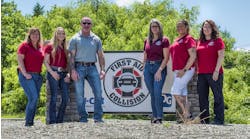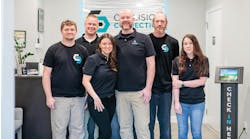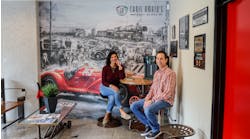Founded in 1955, Mills Body Shops, with four locations in the Evansville, Ind., area, has embraced the latest technology and programs while maintaining the small-town personal customer service that keeps customers coming back, said President/CEO Don Decker Jr.
Mills was an early convert to PPG Envirobase waterborne paint, and it adopted OEM-certification programs before there was a need, said Decker, who, with his brother, COO Britt Decker, own the business. Their father, Don Decker, and his business partner, Jack Vickery – both of whom retain a minority stake in the business – bought the business in 1970 from the original owners, Harold and Velda Mills. The younger Deckers joined the business in the mid ’80s, and the business expanded to four locations by 2003, with each location growing its footprint to meet the need for increased business.
Don Decker Jr. said he and his brother predicted how much following OEM-recommended procedures would be when they decided to pursue OEM certifications.
“I think we’re one of the original shops in the Assured Performance Network,” he said. “When we joined, I didn’t really feel like there was going to be a return on investment at that point in time. And I still can’t point to a return on our investment, but it’s the right thing to do.”
As advanced as today’s vehicles are, with lightweight materials and ADAS, most vehicle owners rarely consider the crashworthiness of their vehicle after it’s been repaired, he said.
“They look at the car and it’s, ‘Yeah, it’s pretty; the color matches,’ and all of that stuff. But it’s more important that those airbags and other safety systems will work as they’re supposed to.”
Early on, the Deckers also predicted OEM certifications would be important to other stakeholders in the collision repair ecosystem.
“I believe we’re finally there,” he said. “I think it’s starting to matter to insurance companies, and of course the dealerships we serve.”
As important as they are, Decker doesn’t yet see that OEM certifications are a significant driver of business to his shops. Customers, whom he calls “guests”, some of whom are now in the third generation of coming to Mills for their collision repairs, have not been as concerned about selecting a shop with OEM certifications, he said.
“We market the certifications and we try to get the word out, but overall, they just know we’ve been around forever and we’ve always been ahead of the curve for training.”
Training program readies apprentices for career
All four shops are I-CAR Gold Class-recognized, technicians receive ongoing OEM training, and painters are PPG-certified. Mills added an apprentice program about five years ago, which pairs a senior technician with an apprentice, who may come to the shop with no training, or who may be a recent graduate from one of the area Southern Indiana Career & Technical Center, in Evansville, or the Earle C. Clements Job Corps Center, about 30 miles southwest, in Morganfield, Ky.
About 20 years ago, Decker transitioned to a new pay structure. Instead of flat rate, the shop pays an hourly rate with a production bonus. This also aids the training program, as the time spent with an apprentice does not cut into the technician’s productivity and pay.
“It just seemed like for the management style we have, with us being more interested in quality, the production will come with time as people learn. It was not an easy transition, but it’s been successful for us.”
When the apprentice has proven his or her aptitude and enthusiasm for continuing the trade, usually within six months or often sooner, he or she is enrolled in the I-CAR Platinum training program.
“Though I have a formal program, I let the technician who’s in charge give me guidance on where the apprentice stands,” Decker said.
PPG MVP Roundtable group is geared toward MSOs
Mills has been a loyal customer of Automotive Color & Supply and PPG Automotive Refinishes for more than 30 years, and Decker takes advantage of multiple training and business-development opportunities available through PPG. One of those is the PPG MVP Roundtable, which allows the Deckers to share ideas with like-minded collision repairers in noncompeting markets, and Decker’s group is geared specifically toward MSOs.
One topic of interest lately has been on scanning and ADAS calibration. Generally speaking, all scans and calibrations that do not require targets are handled in-house.
“We teamed up with asTech when they first came out, so we’re doing our pre- and post-repair scans through asTech. We can do quite a few calibrations in-house, but if it’s beyond certain requirements, we will sublet that to the dealer.”
As demand increases, the next step for Mills may be buying a target and calibration system. Because all four shops are fairly close (one could visit all four on a 30-mile drive), one Mills location would be the designated calibration center, Decker said.
“In our Roundtable, two of the shops have purchased calibration systems. We’re in contact with them and trying to once again figure out our return on investment.”
The Roundtable group has also discussed if shops will focus less on DRPs as OEM programs become more important and prevalent, and if that shift will aid a shop’s bottom line.
“We feel that over time, that’s going to happen at some point or other,” he said. “The OEMs are going to have more of a say on the first notice of loss, and then the shops that have stayed on top of OEM certifications are going to have a competitive advantage. I feel like the influence of insurance companies, at least in my lifetime, isn’t going away, but I think they’re going to be less of a factor.”
Shops differ in size, specialties
Each Mills shop differs in size, layout, and which OEM certifications it holds. All four are Assured Performance-certified, and others are certified for nameplates of the dealerships near them. Altogether, Mills has certifications for the FCA brands, Ford, Nissan, and Subaru, and it is working on achieving GM certification for its north side location.
At more than 16,500 square feet, the Newburgh shop is the largest, with about 14,000 square feet dedicated to production. It was built in 2014 to include a 55-foot paint booth to also handle the group’s fleet/commercial work, which includes class-8 road tractors, boats, RVs, and “pretty much anything that moves.” It’s the only shop added as a greenfield project, after the “big” work outgrew the space in the North Side Evansville shop.
The Newburgh shop also hosts Mills Graphics. With the heavy-duty collision repair work for so many commercial vehicles and pieces of equipment, nearly all had a company name or some other type of decal.
“So it started out as, ‘Hey, let’s do this so they don’t have to go somewhere else and we don’t have to separate it. But as time went on, it kept growing. We do full body wraps, and not just for commercial businesses. We’re wrapping vehicles because people want different-colored cars. It’s really taken off. It’s a tiny percentage of our business, but it’s a profitable part of the business.”
Nationwide transferable warranty is market exclusive
Decker, who oversees marketing activities for the company, also came up with its nationwide lifetime warranty, which is also transferable to the new owner of the vehicle, an exclusive offering in his market.
“If you’re going to warranty your repairs for life, I’ve never really understood why you wouldn’t want to warranty the vehicle for life,” he said.
It’s a self-funded program that seldom has to be used. He pointed out that the terms of the warranty are simple: for any repairs under warranty, the vehicle needs to be returned to one of the Mills shops if the owner is within 150 miles. If the owner now lives outside that radius, Mills works with an independent adjuster or a PPG-certified shop to do the repair work. It’s part of Mills’ philosophy to make customer service as easy as possible; customers are seen as guests, and that’s what they’re called.
“We treat them like they’re coming into our home, not coming into our business, and we want them to be welcome. We want to make this process as painless as possible, whatever that may be. A lot of our guests like us to take the bull by the horns and take care of it for them, but some of them want to be involved in the process quite a bit.”
Mills managers make a point of keeping their guests updated throughout the repair process. The shops use CCC’s UpdatePlus, which can automate appointment reminders and status updates through email or text and links to the estimate.
“But we don’t depend solely on that. We still have a call process for any major changes in the estimating or supplement process.”
It’s just one example in which technology has impacted the industry, which is the greatest challenge facing collision repairers today, Mills figures.
“It almost seems like it’s changing exponentially: keeping up with the OEMs, training, and the tools and equipment you need. I don’t know how a guy could start a body shop from the ground up anymore, unless you just have an unlimited pocketbook. It just has to be so ridiculously expensive.”





